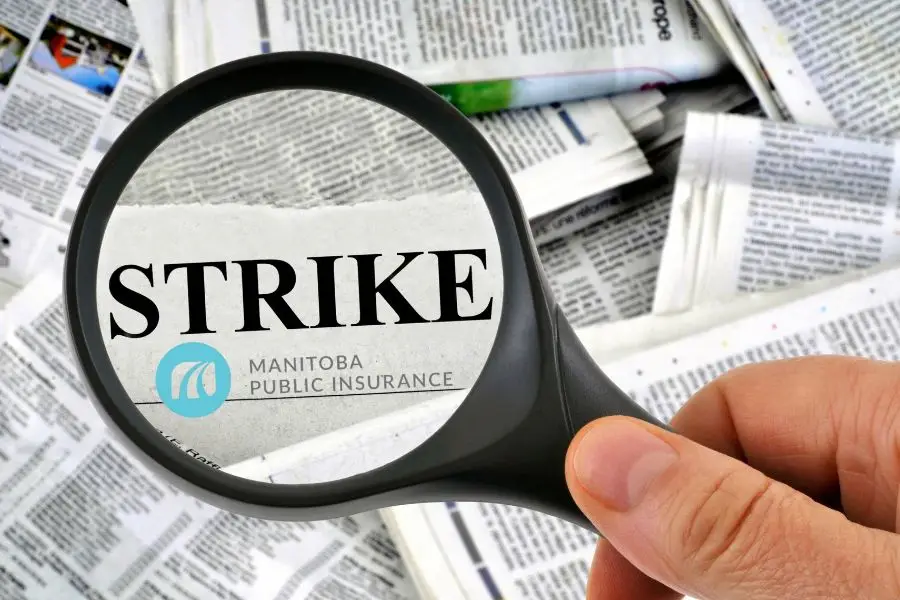The MPI worker strike in Manitoba is exposing more than workplace issues as the auto body industry experiences difficulties amidst ongoing conflict.
by Ian Lau
On August 28, 1,700 workers at Manitoba Public Insurance (MPI) across the province walked out of their jobs and into the streets, marking the beginning of the union’s strike. While MPI employees have been fighting for issues related to wage increases, customers inquiring about collision claims and insurance have had to seek alternative methods to meet their needs.
Due to the closure of MPI locations across the province, Manitobans must turn to MPI-accredited repair shops for services. These repair shops can take on a number of roles that were previously filled by MPI employees. At these locations, customers can make collision damage claims to receive repairs and vehicle estimates.
Among these eligible damage claims are hail damage claims. This year, the number of claims related to hail damage has more than doubled compared to the average number of claims over the past four years.
“The biggest impact to most shops has been three hailstorms that Manitoba has had this summer,” said Denis Cloutier, executive director of Automotive Trades Association of Manitoba (ATA). “The last one hit Winnipeg just five days before the strike and resulted in over 10,000 hail claims.”
Because of the damage to vehicles caused by these hailstorms, MPI has had to turn to the province’s repair shops to take on primary responsibility for the repair process.
In an effort to streamline the claims submission process, MPI has introduced a new customer portal on their website. Cloutier noted that this portal enables vehicle owners to initiate claims and schedule estimates directly with repair shops. Additionally, MPI has increased the Earned Approval Limit to $6,000 for the highest-level shops, significantly reducing approval wait times.
“It was very important to us that we have a process so that customers with hail damage can immediately arrange to have those vehicles estimated,” said Ward Keith, chair of MPI’s board of directors.
Without help from MPI’s IT department workers, this responsibility has been made even more difficult to fulfill.
Amidst this period of uncertainty, auto body shop owners have expressed their challenges stemming from the strike. Peter Posillipo, owner of Finish First Autobody, recently shared with CBC.ca his experience as one of these shop owners who have faced an influx of duties and requests.
“It becomes trying to juggle, keeping people happy, getting their cars estimated,” said Posillipo. “We still gotta keep people happy getting the cars fixed. So… we’re in like management crisis at this point.”
Due to the combination of the damage caused by these massive hailstorms and the MPI strike, auto body repair shops have been overwhelmed with the workload.
As Cloutier mentioned, even before the strike, customers were already facing significant wait times at the shops, with wait times extending to at least eight weeks for vehicle repairs.
“While we have seen a bit of a slow down on approvals and payments compared to before the strike, it so far has been manageable considering that 85% of the staff at MPI are not at work,” said Cloutier. Cloutier also mentioned that the MPI strike has created more anxiety for shops and vehicle owners rather than actual disruption in services.
As the MPI strike remains strong and vocal, both sides of the conflict are not ready to back down. The ongoing strike means auto body repair shops will have to keep serving an unprecedented number of customers.
However, although the strike has created a number of challenges for the vehicle repair industry, it has also become a learning experience.
“We are still hopeful for a resolution to the labour dispute,” said Cloutier, “but it has provided us with some opportunities for process improvements that we hope will remain following the labour dispute.”
In the midst of Saskatchewan preparing to inaugurate its new premier, the striking MPI workers are in a state of anticipation, watching closely to discern how the new leadership may impact the ongoing negotiations between their employer and the union.
The Manitoba Government and General Employees’ Union (MGEU), who represent the striking MPI workers, attribute this conflict to the Premier Heather Stefanson and her cabinet who implemented a bargaining mandate that would severely reduce general wage increases for four years.
“The problem is the employer doesn’t have the direction it needs to bargain with us. They have the old marching orders from the 2 per cent mandate from Heather Stefanson, and they’re waiting on the new mandate from the new government once they’re sworn in,” said MGEU president Kyle Ross.
Manitoba’s Premier-Designate Wab Kinew expressed his support for the striking workers but emphasized the need for additional information to avoid interfering with the existing labour negotiations.
Meanwhile, MPI has proposed arbitration as a means to settle the dispute. However, MGEU refused in pursuit of negotiating at the bargaining table. Ward Keith said MPI would “strongly consider” approaching the Labour Board with this issue if it is not resolved within the coming few weeks.
It is unknown whether an agreement will be reached sooner or later. Until then, repair shops will have no choice but to continue adapting to the circumstances.

